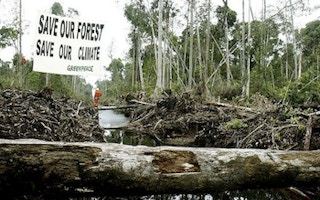One of the world’s largest producers of pulp and paper companies said it will stop cutting trees in Indonesia’s rainforests, after years of public scrutiny and pressure from local and international environmental groups led by Greenpeace.
Jakarta-based Asia Pulp & Paper (APP) announced on Tuesday that they commit to end all further rainforest clearance, including peatland forests. APP is one of just two global pulp and paper producers in Indonesia that has relied on rainforest fibre for its products used by household brands across the world.
APP’s new commitment comes at a crucial time for Indonesia’s forests. The two-year moratorium on deforestation decreed by President Yudhoyono in 2011 expires in May this year.
“We commend APP for making this commitment to end deforestation, but it’s what happens in the forest that counts and we will be monitoring progress closely,” said Bustar Maitar, Head of Greenpeace’s Forest Campaign in Indonesia. “ If APP fully implements its new policies it will mark a dramatic change in direction, after years of deforestation in Indonesia.”
Following their commitment to end forest destruction in Indonesia, the APP has also published a new ‘Forest Conservation Policy’ which laid down important points such as to develop best practice peatland management; new protocol to ensure that the community are consulted of any new plantation development; to practice responsible forest management; and to set monitoring system of their commitments.
Greenpeace said in a statement that their campaign which started in 2010 to transform Indonesia’s pulp and paper sector has seen ground-breaking investigations of APP’s operations and high profile campaigns around the world exposing the global brands whose paper and packaging is supplied from APP.
The environment group added that many global brands suspended contracts with APP and introduced policies removing deforestation from their supply chains after a wave of public pressure inspired by Greenpeace. Over 100 companies have taken action, including Adidas, Kraft, Mattel, Hasbro, Nestlé, Carrefour, Staples and Unilever.
This move by APP is the result of years of pressure from Indonesian and international NGOs challenging its role in large-scale rainforest clearance, including vital wildlife habitat and areas claimed by local communities.
“We urge Indonesia’s government to use the momentum of APP’s move to strengthen and extend the moratorium, starting with a review of all existing forest concessions. As a matter of urgency, the government should improve enforcement of forestry laws to help companies like APP implement their conservation policies. Only concerted action from government, industry and Indonesian civil society can finally turn the tide of extinction facing Sumatra’s tigers,” Maitar said in a statement.
On the other hand, Greenpeace also urged the Asia Pacific Resources International or APRIL, Indonesia’s second-largest pulp and paper producer, to follow the commitment made by APP in saving Indonesia’s rainforests.
In their letter to APRIL, it urged the company to address extensive rainforest and peatland destruction; habitat destruction; illegal logging and trade in protected tree species; and social conflict in the community.
According to statistics provided by Greenpeace, APP and APRIL together account for approximately 80 per cent of Indonesian pulp production. These companies, it said, are currently the only large-scale producers of pulp using rainforest fibre.








